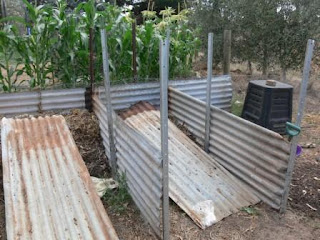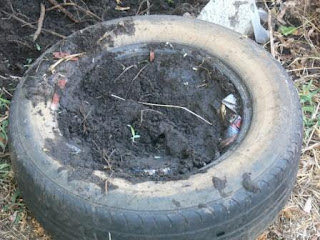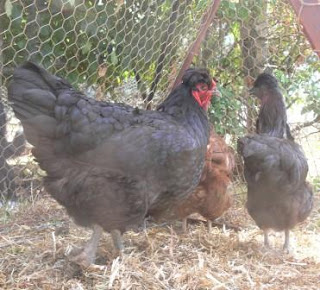I grew up with a green-thumbed mother, a biochemist whose knowledge of plants native and otherwise is exceeded only by her love for them. She can take an apparently sickly specimen of any species, and with the touch of her fingers, the odd repotting and some peaceful neglect, it will be flourishing and producing seedlings by the crateload within weeks. My parents' inner-suburban block is so thick with a tangle of fascinating vegetation that it's known locally as "the jungle house" and tour buses have been known to stop at their driveway for photo opportunities.
So people always expect that I'd share my mother's magical horticultural abilities, and I find myself tucking my thumbs into my fists when discussing gardening, so no-one will see how black they really are. Love of plants has never been an issue: one of the classic family stories involves my toddler self "helping" Mum in the garden, following her along as she weeded a garden bed, happily and carefully replanting every uprooted weed, and then dissolving into tears when she tried to undo my work and explain the purpose of weeding. The idea of these glossy healthy plants (and aren't weeds always glossy and healthy, despite the conditions?) being killed through no fault of their own was too much to bear. As a teenager, I used to "rescue" those poor, terminal potted specimens on the supermarket "discount" racks, bringing them home where I would nurture them until they either died or were taken to my mother with pleas to save them. And she would.
But my love for plants never really translated into gardening skill- most of my attempts ended in sad, wilting failure. At regular intervals I'd cart my leafy victims down to Mum's place for first aid, and usually felt so guilty that I'd leave them there to live out their lives in happiness. When I had my own place in town, I did manage to establish a little veggie garden, which survived against the odds and even provided me with enough tomatoes, capsicums and herbs to keep my hopes alive, if not my crisper full. It also taught me a few of the practicalities of organic veggie gardening, companion planting, composting and garden pests, although the tiny area, squeezed on the edge of a bricked-over backyard and the proximity of herbicidal neighbours were as limiting as my own lack of skill.
Moving down here permanently has involved a good deal of sacrifice on my part: proximity to my family and friends, my career, sport, shopping and general services. But the rewards have been greater, and one of them has been the chance to establish the garden of my dreams. Even with my horticultural disability, I believe it's possible for us to supply a decent amount of our food from our own land. I don't imagine we'll get anywhere near self-sufficiency; I don't have the time or the inclination to be growing and milling our own wheat flour, and baking is purely recreational here. We won't be producing our own fabrics and paper, or our own fuel and power. But fruit, veggies, meat and eggs we can do.
I did inherit an existing veggie garden with this house, out behind the laundry. It had largely gone to seed, and I couldn't bring myself to rip out the old stringy broccoli, silverbeet and unidentified cruciferous vegetables that MIL must have planted 5 years ago, so I just chucked my own seedlings into the barest garden beds without much preparation.
It wasn't a great success. I did get a fair crop of tomatoes, enough to keep us in salads and tomato sauce for months, but blossom end rot kicked in and the insects had a field day. The lettuces all bolted to seed in a burst of hot weather; this turned out okay in the end because I let them self seed and we had a thousand lovely gourmet lettuces just a couple of months later. My best crops were the zucchini which came up on its own down by the septic drain and produced a bumper harvest, and the peas which germinated from the pea straw I mulched with. Everything else was a bit of a flop.

This year I'm doing things a little bit more right (how's THAT grammar?).

We started late, but went back to basics and put some effort into
soil preparation. A few trips to and from the shearing shed gave me half a tonne of sheep shit to dig into the soil, layer into the compost heaps, and mulch on directly.

R picked up a trailer load of
pea straw, which again mulched up the garden beds and went into the compost.

And the
compost: finally we got around to chucking up some stalls for free standing compost heaps, and resurrecting my plastic compost bin from the city. I cleared out the roller bin and used the rotting scraps to start the other heaps, and freshened it up with some grass clippings and straw.

I
fenced off the garden beds against
marauding pests, and finally took a deep breath and pulled out all the old vegetables and potted up some inconveniently placed herbs.
Then I got planting.

We currently have lots of
tomatoes, interspersed with
basil and
marigolds,
corn and
sunflowers with
rockmelons (aka cantaloupes) below, lots of self-sown
peas, an established
rhubarb, some healthy
silverbeet from seed I'd saved last year,
eggplants and
capsicums,
jerusalem artichokes (yum!) from my mother's garden, and
spring onions, a few
leeks and a couple of
beans that survived from last year. Last year's
passionfruit is still alive, but looking rather moth-eaten and seedy, so I've planted another one.
 Corn before:
Corn before:
 Corn now:
Corn now:

There's a
cucumber just getting going, and a couple of something leafy that have come up on their own in the tomato beds- maybe
pumpkins or
zucchini? I know they may be sterile, but they are so healthy and vigorous I'm prepared to give them the benefit of the doubt. If nothing else, they keep the weeds down.

My undoubted favourites are the
watermelons. I'm already drooling over the tiny green fruit buds, and cheering on the fuzzy Triffid tendrils. My first lot were commercial seedlings, and they're doing okay, but I have high hopes for my new heritage variety.



The
herbs have been released from their pot bound verandah existence to take their chances in the circular garden bed just outside the house gate, beneath a rose bush. Some are doing well, others not so much, but there has to be an element of survival of the fittest in my garden.

I've even chucked some
potatoes into the soil, using the "old tyre" method. I planted some seed spuds (well, sprouting spuds from from the back of the pantry) in a bed of straw and manure in the tyre, covered with dirt, and as they sprout we'll add more tyres and more dirt/straw/manure.

My next project will be the orchard. We already had a row of young
olive trees, a couple of
grape vines, an ex-espaliered
apple, prolific
orange and
lemon trees and a
nectarine, multi-variety grafted
plum and an
apricot, but the stonefruits and apple are attacked by parrots every year, leaving nothing to ripen. We did get a bucket full of yellow fruit from one branch of the plum that hung down beside the puppy pen, so presumably the pups kept the birds at bay. It's heartbreaking to see hundreds of green fruit littering the ground beneath the fruit trees. Next year they'll all be pruned and netted.
Mum had given me a few young trees she'd potted up at her place, and they'd survived in our yard for a year or so. But they'd started to suffer this summer, and although the heat made it a poor time to transplant, they had to go. So I put a couple of
jacarandahs and
mulberries beside the gate to the training paddock where we need shade, and a couple of
Illawarra flame trees in the front garden.
One of the mulberries by the training paddock gate:

A very pot-bound
fig tree is beside the existing stonefruits, and a
Brazilian cherry went near the compost heaps. All of them are still alive, and some are even starting to shoot. We already have a huge fruiting mulberry, and the Pine Tree paddock by the house has a couple of enormous ancient figs which produce so much fruit that we happily share with the birds and have some left over.
Brazilian cherry and the training paddock:

Only my trusty
miniature peach is left in a pot, and one day I'll give that its freedom too.
Best of all, when Nan came over to train on Friday she brought with her four additions to our family:
Henny, Penny, Jenny and Nan. They're apparently Araucana crosses, a little on the elderly side, and BabyJ just loves them. Eventually we hope they'll free range by day, and we'll have a sturdier, more fox-proof enclosure for them, maybe around the orchard so they can clean up the fruit trees. But for now they're chook tractoring around the veggie patch, and have already rewarded us with some pretty blue eggs. BabyJ is in love!











